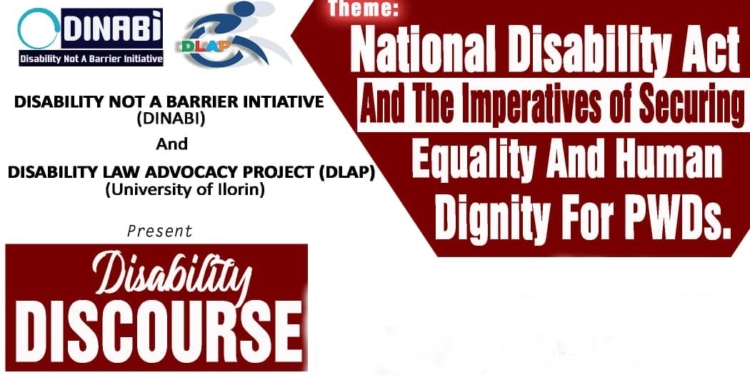The Disability is Not a Barrier Initiative (DINABI) and Disability Law Advocacy Project (DLAP) has organised a Disability Discourse themed “National Disability Act and the Imperatives of Securing Equality and Human Dignity for Persons With Disability”
The virtual meeting was facilitated by Azubike Onuora-Oguno, a senior lecturer at the University of Ilorin. Mr Azubike said during the meeting that the national disability act is yet to be developed to protect the right of persons with disabilities.
According to one of the guest speakers, Dr Ngozi Chuma Umeh, Senior lecturer Imo State Owerri “about 27 million Nigerians live with disabilities. They face violation and discrimination of their rights and it is up to us to work together to build a future for everyone especially for persons with disabilities.”
Dr Ngozi said “we should start from our communities to make the change. We need to both as individuals and organisations enlighten people as much as possible in our discussions and to make issues of persons with disability part of our school curriculum and in churches and mosques.”
Ms Titilope Anifowoshe, the Special Assistant to the Minister of State for Transportation admitted that until recently she knew little or nothing about PWDs but now she champions a course to raise NGN500,000 to get brails for 10 visually impaired students in her community. She said, “I am going to kick-start negotiation for the transportation ministry to give special attention to Persons With Disabilities.”
Speaking on health equity under the national disability act Dr Uzoma Prince-Oparaku, a research fellow at the Nigerian Institute of Advance and Legal Studies, the second guest speaker at the event said “We must make effort to test the limit of the provisions of the national disability act”
“As individuals, we should push for compliance from organisations and individuals. We should not wait for the government, we should do advocacy by action in our areas of influence” stressing that more states should implement and domesticate the act as a way to improve the health equity for persons living with a disability.
Highlighting the challenges of persons with disabilities in relation to section 8 of the national disability act, Dr Uzoma said “persons with disabilities should complain and can get lawyers on pro bono who will be willing to help fight for their rights.”
“We need to advocate a little more visible in our conversation, that way people put that in their thoughts”

